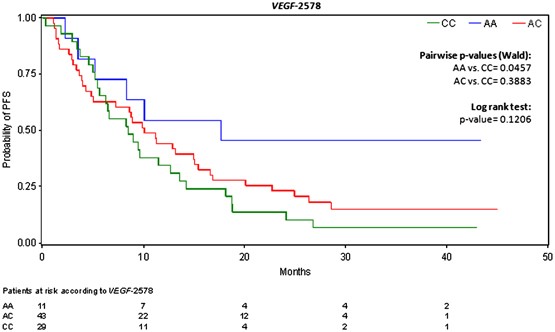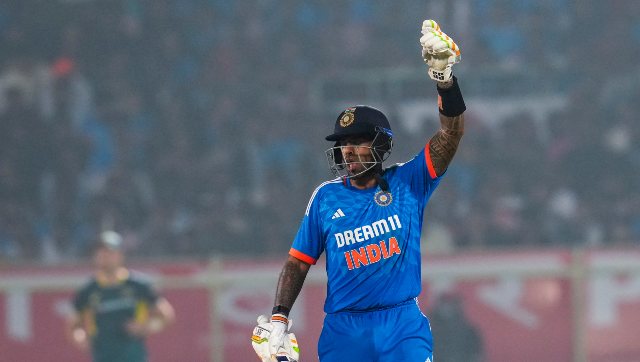
- Select a language for the TTS:
- UK English Female
- UK English Male
- US English Female
- US English Male
- Australian Female
- Australian Male
- Language selected: (auto detect) - EN
Play all audios:
ABSTRACT The aim of the study was to evaluate the association of vascular endothelial growth factor (_VEGF_) genotypes with treatment efficacy in a phase II trial. This study evaluated
weekly docetaxel, as first-line treatment for metastatic breast cancer. Existing data from _in vitro_ and animal model experiments suggest that docetaxel at low doses has anti-angiogenic
activity. DNA was extracted from blood samples of 86 patients participating in the trial. Genotyping was performed for selected single-nucleotide polymorphisms (SNPs; _VEGF_−2578, −1498,
−1154, and +936). Moreover, due to the highly polymorphic nature of the studied areas, we were able to analyze additional registered SNPs. All candidate genotypes were evaluated for
associations with overall survival (OS), progression-free survival (PFS) and response rate. The _VEGF_−1154 GG genotype was more frequent in patients not responding to treatment compared
with responders (42.9% vs 0.0%, _P_=0.048). Moreover, the _VEGF_−2578 AA genotype was associated with longer PFS compared with CC (hazard ratio (HR)=0.40; 95% confidence interval (CI)
0.17–0.98; pairwise _P_=0.0457). Patients with the _VEGF_−1190 GG genotype demonstrated shorter PFS compared with those with the alternative genotypes (GA and AA) combined (HR=3.85; 95% CI:
1.20–12.50; _P_=0.0224). In addition, the _VEGF_−2551/−2534 homozygous del18bp and _VEGF_−2430/−2425 homozygous ins1bp genotypes were associated with worse PFS compared with no deletion and
no insertion, respectively (HR=2.49; 95% CI: 1.02–6.07; pairwise _P_=0.0442 and HR=2.57; 95% CI: 1.05–6.27; pairwise _P_=0.0385, respectively). Furthermore, patients with the _VEGF_−1498 CC
genotype exhibited longer median OS compared with those with the alternatives genotypes (CT and TT) combined (HR=0.27; 95% CI: 0.08–0.89; _P_=0.0311). In multivariate analysis, the
_VEGF_−2578 AA genotype retained its significance (_P_=0.0220) for PFS. Our results support the association of specific _VEGF_ genotypes with clinical outcome in patients with metastatic
breast cancer treated with a potentially anti-angiogenic regimen, such as weekly docetaxel. However, current results should be validated prospectively in larger cohorts. Access through your
institution Buy or subscribe This is a preview of subscription content, access via your institution ACCESS OPTIONS Access through your institution Subscribe to this journal Receive 6 print
issues and online access $259.00 per year only $43.17 per issue Learn more Buy this article * Purchase on SpringerLink * Instant access to full article PDF Buy now Prices may be subject to
local taxes which are calculated during checkout ADDITIONAL ACCESS OPTIONS: * Log in * Learn about institutional subscriptions * Read our FAQs * Contact customer support SIMILAR CONTENT
BEING VIEWED BY OTHERS PROSPECTIVE VALIDATION OF _VEGF_ AND _ENOS_ POLYMORPHISMS AS PREDICTORS OF FIRST-LINE BEVACIZUMAB EFFICACY IN PATIENTS WITH METASTATIC COLORECTAL CANCER Article Open
access 09 August 2023 _VEGF-A_, _VEGFR1_ AND _VEGFR2_ SINGLE NUCLEOTIDE POLYMORPHISMS AND OUTCOMES FROM THE AGITG MAX TRIAL OF CAPECITABINE, BEVACIZUMAB AND MITOMYCIN C IN METASTATIC
COLORECTAL CANCER Article Open access 24 January 2022 INFLUENCE OF NOS3 RS2070744 GENOTYPES ON HEPATOCELLULAR CARCINOMA PATIENTS TREATED WITH LENVATINIB Article Open access 13 October 2020
REFERENCES * Folkman J . Angiogenesis in cancer, vascular, rheumatoid and other disease. _Nat Med_ 1996; 1: 27–31. Google Scholar * Ferrara N . VEGF and the quest for tumour angiogenesis
factors. _Nat Rev Cancer_ 2002; 2: 795–803. Google Scholar * Hicklin DJ, Ellis LM . Role of the vascular endothelial growth factor pathway in tumor growth and angiogenesis. _J Clin Oncol_
2005; 23: 1011–1027. Google Scholar * Shibuya M, Claesson-Welsh L . Signal transduction by VEGF receptors in regulation of angiogenesis and lymphangiogenesis. _Exp Cell Res_ 2006; 312:
549–560. Google Scholar * Kerbel RS . Tumor angiogenesis. _N Engl J Med_ 2008; 358: 2039–2049. Google Scholar * Rivera E, Mejia JA, Arun BK, Adinin RB, Walters RS, Brewster A _et al_.
Phase 3 study comparing the use of docetaxel on an every-3-week versus weekly schedule in the treatment of metastatic breast cancer. _Cancer_ 2008; 112: 1455–1461. Google Scholar * Sparano
JA, Wang M, Martino S, Jones V, Perez EA, Saphner T _et al_. Weekly paclitaxel in the adjuvant treatment of breast cancer. _N Engl J Med_ 2008; 358: 1663–1671. Google Scholar * Kamat AA,
Kim TJ, Landen CN Jr, Lu C, Han LY, Lin YG _et al_. Metronomic chemotherapy enhances the efficacy of antivascular therapy in ovarian cancer. _Cancer Res_ 2007; 67: 281–288. Google Scholar *
Benelli R, Monteghirfo S, Balbi C, Barboro P, Ferrari N . Novel antivascular efficacy of metronomic docetaxel therapy in prostate cancer: hnRNP K as a player. _Int J Cancer_ 2009; 124:
2989–2996. Google Scholar * Pectasides D, Papaxoinis G, Kotoula V, Fountzilas H, Korantzis I, Koutras A _et al_. Expression of angiogenic markers in the peripheral blood of
docetaxel-treated advanced breast cancer patients: a Hellenic Cooperative Oncology Group (HeCOG) study. _Oncol Rep_ 2012; 27: 216–224 doi: 10.3892/or.2011.1504. Google Scholar * Schneider
BP, Wang M, Radovich M, Sledge GW, Badve S, Thor A _et al_. Association of vascular endothelial growth factor and vascular endothelial growth factor receptor-2 genetic polymorphisms with
outcome in a trial of paclitaxel compared with paclitaxel plus bevacizumab in advanced breast cancer: ECOG 2100. _J Clin Oncol_ 2008; 26: 4672–4678. Google Scholar * Simon RM, Paik S, Hayes
DF . Use of archived specimens in evaluation of prognostic and predictive biomarkers. _J Natl Cancer Inst_ 2009; 101: 1446–1452. Google Scholar * McShane LM, Altman DG, Sauerbrei W, Taube
SE, Gion M, Clark GM . REporting recommendations for tumor MARKer prognostic studies (REMARK). _Breast Cancer Res Treat_ 2006; 100: 229–235. Google Scholar * Jain L, Vargo CA, Danesi R,
Sissung TM, Price DK, Venzon D _et al_. The role of vascular endothelial growth factor SNPs as predictive and prognostic markers for major solid tumors. _Mol Cancer Ther_ 2009; 8: 2496–2508.
Google Scholar * Schneider BP, Radovich M, Miller KD . The role of vascular endothelial growth factor genetic variability in cancer. _Clin Cancer Res_ 2009; 15: 5297–5302. Google Scholar
* Koutras AK, Antonacopoulou AG, Eleftheraki AG, Dimitrakopoulos FI, Koumarianou A, Varthalitis I _et al_. Vascular endothelial growth factor polymorphisms and clinical outcome in colorectal
cancer patients treated with irinotecan-based chemotherapy and bevacizumab. _Pharmacogenomics J_ 2012; 12: 468–475 doi: 10.1038/tpj.2011.37. Google Scholar * Mohammadi M, Ollier W .
Hutchinson IV. A functional association study of VEGF gene promoter polymorphisms with VEGF expression by stimulated pbm cells. _Hum Immunol_ 2003; 64: S125. Google Scholar * Jacobs EJ,
Feigelson HS, Bain EB, Brady KA, Rodriguez C, Stevens VL _et al_. Polymorphisms in the vascular endothelial growth factor gene and breast cancer in the Cancer Prevention Study II cohort.
_Breast Cancer Res_ 2006; 8: R22. Google Scholar * Jin Q, Hemminki K, Enquist K, Lenner P, Grzybowska E, Klaes R _et al_. Vascular endothelial growth factor polymorphisms in relation to
breast cancer development and prognosis. _Clin Cancer Res_ 2005; 11: 3647–3653. Google Scholar * Lu H, Shu XO, Cui Y, Kataoka N, Wen W, Cai Q _et al_. Association of genetic polymorphisms
in the VEGF gene with breast cancer survival. _Cancer Res_ 2005; 65: 5015–5019. Google Scholar * Fukuda H, Tsuchiya N, Narita S, Kumazawa T, Horikawa Y, Inoue T _et al_. Clinical
implication of vascular endothelial growth factor T-460C polymorphism in the risk and progression of prostate cancer. _Oncol Rep_ 2007; 18: 1155–1163. Google Scholar * Burstein HJ, Chen YH,
Parker LM, Savoie J, Younger J, Kuter I _et al_. VEGF as a marker for outcome among advanced breast cancer patients receiving anti-VEGF therapy with bevacizumab and vinorelbine
chemotherapy. _Clin Cancer Res_ 2008; 14: 7871–7877. Google Scholar * Gianni L, Romieu G, Lichinitser M, Serrano S, Mansutti M, Pivot X _et al_. First results of AVEREL, a randomized phase
III trial to evaluate bevacizumab (BEV) in combination with trastuzumab (H)+docetaxel (DOC) as first-line therapy for HER2-positive locally recurrent/metastatic breast cancer (LR/mBC). _San
Antonio Breast Cancer Symposium_ 2011, Abstract S4–S8. * Miles DW, de Haas SL, Dirix LY, Romieu G, Chan A, Pivot X _et al_. Biomarker results from the AVADO phase 3 trial of first-line
bevacizumab plus docetaxel for HER2-negative metastatic breast cancer. _Br J Cancer_ 2013; 108: 1052–1060. Google Scholar * Schneider BP, Gray RJ, Radovich M, Shen F, Vance G, Li L _et al_.
Prognostic and predictive value of tumor vascular endothelial growth factor gene amplification in metastatic breast cancer treated with paclitaxel with and without bevacizumab; results from
ECOG 2100 trial. _Clin Cancer Res_ 2013; 19: 1281–1289. Google Scholar * Schneider BP, Skaar TC, Sledge GW, Badve S, Li L, Flockhart DA . Analysis of angiogenesis genes from
paraffin-embedded breast tumor and lymph nodes. _Breast Cancer Res Treat_ 2006; 96: 209–215. Google Scholar * Coltelli L, Allegrini G, Orlandi P, Giuntini N, Alì G, Fioravanti A _et al_.
Discordant somatic and germline VEGF-A genotype in a cancer patient resistant to paclitaxel/bevacizumab with chemosensitive hepatic metastasis. _Pharmacogenomics_ 2009; 10: 1225–1229. Google
Scholar Download references AUTHOR INFORMATION AUTHORS AND AFFILIATIONS * Division of Oncology, Department of Medicine, University Hospital, University of Patras Medical School, Patras,
Greece A K Koutras & H P Kalofonos * Department of Pathology, Aristotle University of Thessaloniki School of Medicine, Thessaloniki, Greece V Kotoula & K Papadopoulou * Department of
Clinical Therapeutics, ‘Alexandra’ Hospital, University of Athens School of Medicine, Athens, Greece C Papadimitriou & F Zagouri * Department of Medical Oncology, ‘Papageorgiou’
Hospital, Aristotle University of Thessaloniki School of Medicine, Thessaloniki, Greece D Dionysopoulos & G Fountzilas * Department of Pathology, University Hospital of Patras, Patras,
Greece H P Kourea * Second Department of Medical Oncology, ‘Metropolitan’ Hospital, Piraeus, Greece D V Skarlos * Third Department of Medical Oncology, ‘Agii Anargiri’ Cancer Hospital,
Athens, Greece E Samantas * Second Department of Medical Oncology, Hygeia Hospital, Athens, Greece P Kosmidis * Second Department of Internal Medicine, Oncology Section, ‘Hippokration’
Hospital, Athens, Greece D Pectasides Authors * A K Koutras View author publications You can also search for this author inPubMed Google Scholar * V Kotoula View author publications You can
also search for this author inPubMed Google Scholar * C Papadimitriou View author publications You can also search for this author inPubMed Google Scholar * D Dionysopoulos View author
publications You can also search for this author inPubMed Google Scholar * F Zagouri View author publications You can also search for this author inPubMed Google Scholar * H P Kalofonos View
author publications You can also search for this author inPubMed Google Scholar * H P Kourea View author publications You can also search for this author inPubMed Google Scholar * D V
Skarlos View author publications You can also search for this author inPubMed Google Scholar * E Samantas View author publications You can also search for this author inPubMed Google Scholar
* K Papadopoulou View author publications You can also search for this author inPubMed Google Scholar * P Kosmidis View author publications You can also search for this author inPubMed
Google Scholar * D Pectasides View author publications You can also search for this author inPubMed Google Scholar * G Fountzilas View author publications You can also search for this author
inPubMed Google Scholar CORRESPONDING AUTHOR Correspondence to A K Koutras. ETHICS DECLARATIONS COMPETING INTERESTS The authors declare no conflict of interest. POWERPOINT SLIDES POWERPOINT
SLIDE FOR FIG. 1 POWERPOINT SLIDE FOR FIG. 2 POWERPOINT SLIDE FOR FIG. 3 POWERPOINT SLIDE FOR FIG. 4 POWERPOINT SLIDE FOR FIG. 5 RIGHTS AND PERMISSIONS Reprints and permissions ABOUT THIS
ARTICLE CITE THIS ARTICLE Koutras, A., Kotoula, V., Papadimitriou, C. _et al._ Vascular endothelial growth factor polymorphisms and clinical outcome in patients with metastatic breast cancer
treated with weekly docetaxel. _Pharmacogenomics J_ 14, 248–255 (2014). https://doi.org/10.1038/tpj.2013.36 Download citation * Received: 25 May 2013 * Revised: 03 August 2013 * Accepted:
15 August 2013 * Published: 24 September 2013 * Issue Date: June 2014 * DOI: https://doi.org/10.1038/tpj.2013.36 SHARE THIS ARTICLE Anyone you share the following link with will be able to
read this content: Get shareable link Sorry, a shareable link is not currently available for this article. Copy to clipboard Provided by the Springer Nature SharedIt content-sharing
initiative KEYWORDS * breast cancer * clinical outcome * polymorphisms * vascular endothelial growth factor * weekly docetaxel





)

